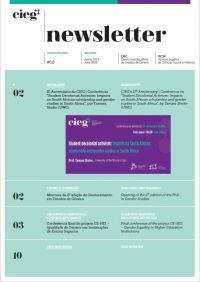II International CIEG Congress
24, 25 and 26 july, 2019
Gender, Feminist and Women’s Studies: Reflexivity, resistance and action
Over the last decade, gender issues have been hotly debated. The financial, economic and migration crisis, which has accentuated the precariousness in the living conditions of the populations and raised fears and feelings of insecurity, has created the grounds for the emergence of authoritarian, dictatorial leaderships that use sexism, homophobia, and xenophobia, attacking directly gender equality issues, when not overtly defending the use of violence.
While there have been reactions against these politics - huge demonstrations on the streets or in the social media, where activists have had a very relevant role – the fact is that they have been unable to stop these movements from growing. And despite being supported by powerful economic and military interests, authoritarian leaders continue to find additional supporters among the disempowered and the poor, who unfortunately believe that they are the solution for their problems.
But why is gender equality under attack? Why do these new authoritarian leaders use sexism and homophobia as weapons in their nationalist discourses? Why is it that in countries where these policies are not so strong, we are nevertheless still witnessing a sort of backlash, or what some consider an anti-genderism trend? Importantly too, how are these trends affecting academic life and women’s, gender and feminist studies? And what strategies have been developed to address attempts to erase, marginalise and/or silence the field?
With a view to stimulate dialogues among researchers from different regions of the world, the II International Congress of CIEG, the Research Centre on Gender Studies of the University of Lisbon, will debate these questions, seeking papers that aim to:
1) Discuss current gender controversies, namely the attacks on gender equality that have been framed around the concept of ‘gender ideology’, from a feminist lens and/or an anthropological, psychological, sociological, historical, legal, political, linguistic, artistic and/or spatial perspective;
2) Examine the processes of discrimination, stigmatisation and exclusion on the grounds of gender and sexual orientation, present on traditional and/or digital media and in various spheres of social life at local, regional and global levels;
3) Identify and analyse the strategies of resistance that are emerging to confront sexism and homophobia in a diversity of contexts - education, work, family life, politics, law and academia – and the hurdles and barriers that they face;
4) Reflect upon the role of law, public policies and national and international institutions in advancing gender equality.
5) Analyse other themes related to gender equality,feminist and women’s and studies, within the scope of the social sciences, the humanities, the health sciences, and other artistic and scientific areas.
Congress Languages:
Portuguese, English and Spanish. Simultaneous translation available only in plenary sessions.
Important dates:
- February 15, 2019 – Deadline for abstracts submission, with a maximum of 300 words. Abstract submission platform available from January 9 (the link will be available on CIEG’s website and facebook page).
- March 15, 2019 – Deadline for notice of abstracts’ acceptance/ rejection.
- May 15, 2019 – Deadline to register with a reduced Early Bird registration fee.
- May 31, 2019 - Final registration deadline for participants with accepted abstracts (Participants not registered will be withdrawn from the Congress Programme).
|
Registration |
Early bird (up until may 15th 2019) |
After may 15th 2019 |
|
Participant |
190 € |
240 € |
|
Student |
120 € |
170 € |
|
Lower income e middle-lower income countries |
150 € |
200 € |
Venue:
Institute for Social and Political Sciences, Lisbon, Portugal.

